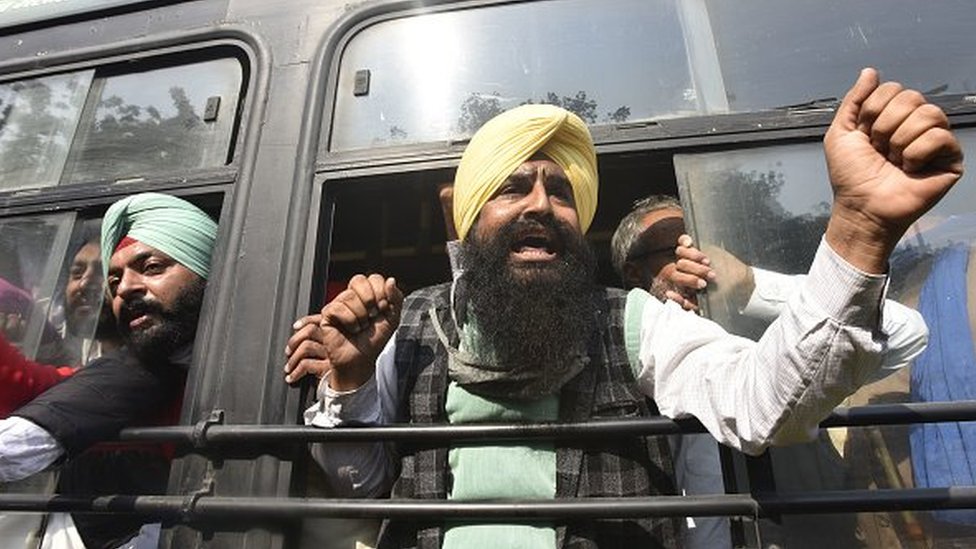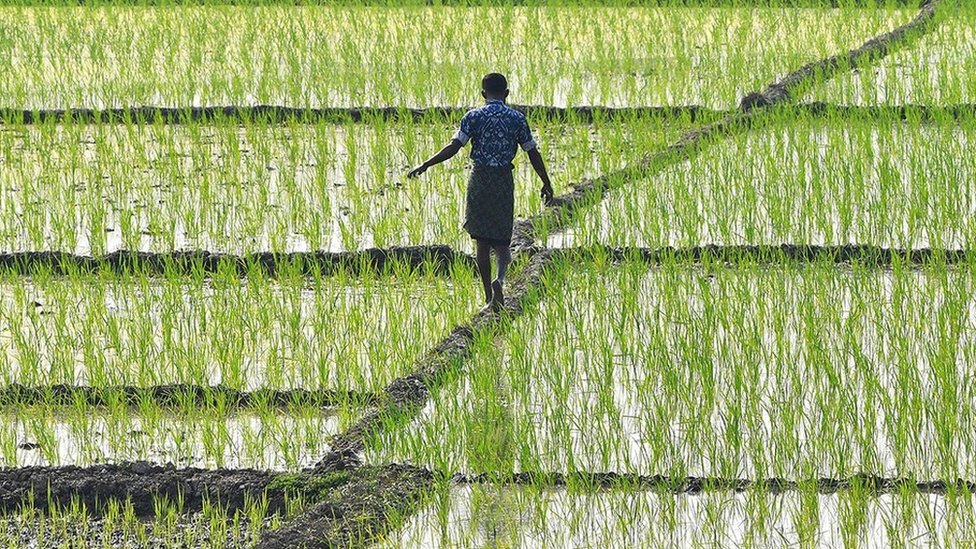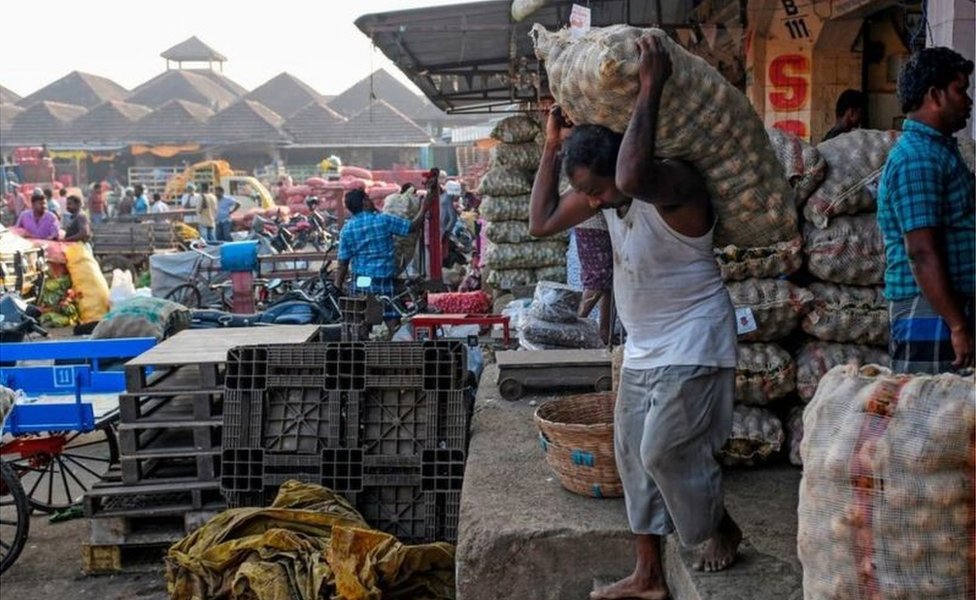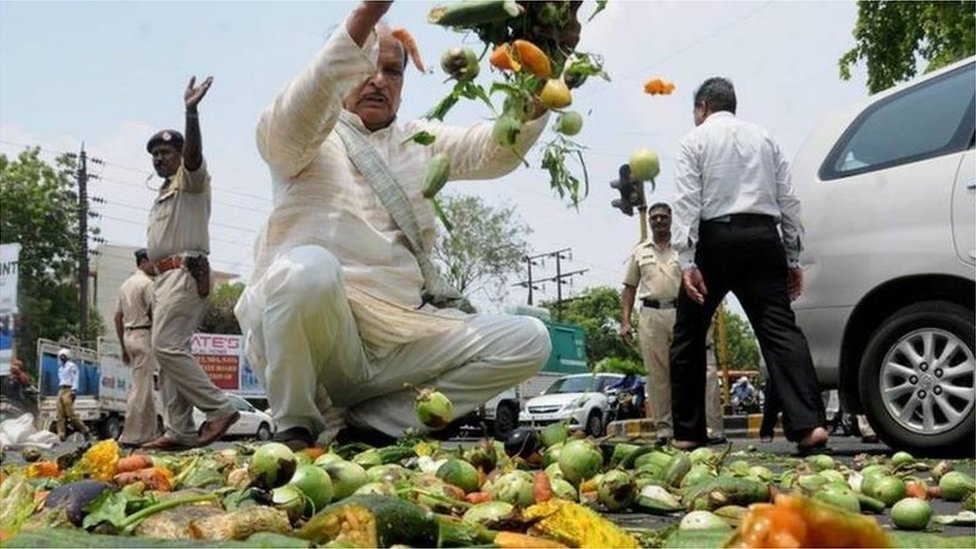
Tens of thousands of farmers like Mr Vyas from the neighbouring states of Punjab and Haryana are now in a grinding standoff with Narendra Modi's Bharatiya Janata Party-led government, demanding the repeal of
three market-friendly laws. Taken together, the contentious reforms will loosen rules around the sale, pricing and storage of farm produce - rules that have protected India's farmers from an unfettered free market for decades.For nearly a week, the protesting farmers, joined by their families and friends, have braved water cannons and tear gas and choked the capital's borders. They have set up camps, cooked and slept in the open in the bitter cold. "This protest is unique. It is not driven by politics or religion. In fact, politicians are reacting to it," says Devinder Sharma, a food and trade policy analyst. In September, a key ally of the government quit in protest against the laws.
Farmers have been on the boil in India for some years now. More than half of Indians work on farms, but farming accounts for barely a sixth of the country's GDP. Declining productivity and lack of modernisation have long hobbled progress. Plot sizes are shrinking, as are incomes from farming. Prices can be wildly erratic and middlemen form cartels and gobble up much of the profits. "The anger over injustice to farmers was brewing. Now it's getting channelised through this protest against the new laws," Mr Sharma says.

On the face of it, India's farmers shouldn't be complaining.
The government provides them generous subsidies, exemption from income tax and crop insurance. They are guaranteed prices for 23 crops and debts are waived when they are unable to pay off loans. "Now the government is saying, we will get out of the way, and asking us to deal directly with big businesses. But we didn't demand this in the first place! So why are they doing this to us?" Mr Vyas told me.
At the root of this anger is the Indian farmers' deep distrust of market reforms.
India's farmers are mostly small or marginal: 68% of them own less than one acre of land. Only 6% of them actually receive guaranteed price support for their crops, and more than 90% of the farmers sell their produce in the market. More than half of the farmers, in the words of an economist, "don't even have enough to sell". The populous and poor northern state of Bihar has allowed unrestricted private trade of crops, but there are few private buyers there. India's foray into contract farming has been patchy, working mainly for a few commodities in limited geographies.
Not surprisingly, for the large number of farmers, incomes are dwindling. According to the 2016 Economic Survey, the average annual income of a farming family in more than half of India's states was a paltry 20,000 rupees ($271; £203). "How will people have faith in the market if the incomes are so low even when most crop transactions are already private?" Mr Sharma asks.

For long, farmers have sold their crops in 7,000-odd government-regulated wholesale markets or "mandis" across the country. They are run by committees made up of farmers, often large land-owners, and traders or "commission agents" who act as middlemen for brokering sales, organising storage and transport, and even financing deals. The new reforms allow farmers to rely less on these markets and promise to improve their income.
But farmers are not convinced. "We will lose our lands, we will lose our income if you let big business decide prices and buy crops. We don't trust big business. Free markets work in countries with less corruption and more regulation. It can't work for us here," Gurnam Singh Charuni, one of the main leaders of the agitation, told me.
Reforming farming in India is a fiendishly complex challenge.
On the one hand, a large portion of the population - big and small farmers, and the landless who work on farms - need to be ensured a decent income.

On the other hand, there are well-founded questions about food security and the impact of farming on the environment.
Farmers in Punjab, Haryana and Maharashtra states, for example, need to be weaned away from producing an excess of subsidised, water-guzzling crops such as wheat, paddy and sugarcane that deplete groundwater. A glut of these crops has led to overflowing stocks and paltry gains to farmers.
Then there's the challenge of moving people out of un-remunerative farming to factory jobs. But where are the jobs, ask some experts, who say such sweeping change cannot stem from isolated reforms, especially in a country that is still so dependent on agriculture.
When Mr Modi locked down India at four hours notice in March to stop the spread of coronavirus, tens of millions of jobless workers streamed out of the cities and returned to the security of their farmlands. Despite low productivity, land remains the only security for many Indians.
"Freedom is about actual, viable choices. Choices that you can realise. The point is to expand opportunities and you need to do that by investment in agriculture and the creation of livelihoods off the field," says Mekhala Krishnamurthy, an associate professor of sociology and anthropology at Ashoka University.
Read more from Soutik Biswas
What appears to be clear now is that Mr Modi's farm reforms were poorly conceived. Pushing them during a pandemic without consulting the main stakeholders flies against India's federalist traditions. Farmers complain of insufficient routes to settle disputes with private buyers in the proposed arrangement. Others wonder how transaction and prices will be tracked in an open market system. "These laws are not supported by sufficient regulation. When you announce reforms without addressing all the concerns, they produce uncertainty and confusion," says Prof Krishnamurthy.
Experts like Mr Sharma say instead of doing away with the designated wholesale markets, India should actually have more of them to cover the country.
He says guaranteed support prices should be made a "legal right" for farmer and they should be extended to cover a wider range of crops. Kerala, for example, has decided to pay farmers the cost of production and a 20% mark-up for more than a dozen vegetables. And lastly, farmers who don't have land should be provided increased direct income support - they get 6,000 rupees a month now.
The moral of the story is Indian agriculture needs deeper structural reforms after consultations with stake holders and political parties. "Agricultural market reform is political," says Prof Krishnamurthy. "And the food on your plate is never a product of a total free market anywhere in the world."
https://ift.tt/36zjRPW
World
Bagikan Berita Ini














0 Response to "What has brought India's farmers to the streets? - BBC News"
Post a Comment